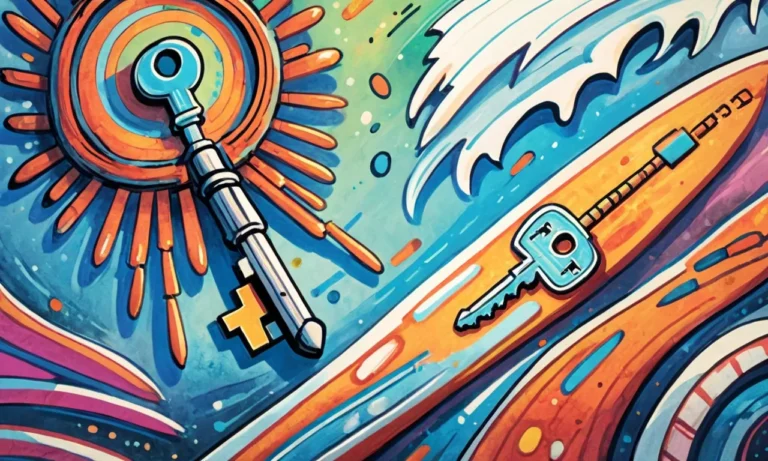It Was All A Dream Meaning
Have you ever had one of those moments where you’re convinced that everything around you is just a dream? Maybe it happens when you’re feeling particularly stressed or overwhelmed. Or perhaps you’ve watched a movie with a mind-bending plot and can’t shake the feeling that reality isn’t what it seems. In this blog post, we’ll explore the meaning behind the phrase “it was all a dream” and how it relates to our daily lives.
Breaking Down the Meaning of Dreams
Dreams are a fascinating aspect of human consciousness. They can be both illuminating and perplexing, offering glimpses into our deepest desires, fears, and insecurities. But what do dreams mean? Are they simply random collections of images and thoughts, or do they hold deeper symbolism?
One popular theory suggests that dreams serve as a form of problem-solving for the brain. According to this idea, while we sleep, our minds work through issues and challenges from our waking lives. This could explain why many people report experiencing vivid and memorable dreams after particularly stressful or challenging days.
Another interpretation posits that dreams are a way for us to explore different aspects of our personalities and identities. In this view, the strange and surreal nature of dreams allows us to tap into parts of ourselves we might not otherwise access in our everyday lives. By engaging with these various facets, we can gain greater self-awareness and understanding.
The Psychology of Dreams
Psychologists have long been interested in the study of dreams. Sigmund Freud, for example, believed that dreams were a window into the unconscious mind, revealing repressed desires and fears. He argued that by analyzing our dreams, we could uncover valuable insights about ourselves and our emotional well-being.
Other psychologists, such as Carl Jung, took a different approach to dream interpretation. Rather than focusing on personal repression, Jung believed that dreams served as a form of “collective unconsciousness” – tapping into universal archetypes and symbols that transcend individual experience.
Today, many psychologists emphasize the importance of understanding the context in which dreams occur. They suggest that dream content should be analyzed alongside other factors, such as the dreamer’s current life situation, emotional state, and cultural background. This holistic approach helps to create a more nuanced understanding of what dreams mean for each individual.
The Philosophy of Dreams
Philosophers have also wrestled with the question of what dreams mean. Some argue that dreams are entirely meaningless – mere byproducts of random neural activity during sleep. In this view, attempting to interpret dreams is a futile exercise in futility.
Others contend that dreams do hold significance, even if it’s difficult to pin down exactly what that means. They suggest that dreaming serves an important function within human cognition and consciousness – perhaps as a form of creative problem-solving or emotional processing.
At the end of the day, there is no definitive answer to the question of what dreams mean. Instead, it depends on your perspective and how you choose to engage with this mysterious aspect of our minds.
Dream Symbolism in Popular Culture
The idea of “it was all a dream” has been popularized in various forms of media over the years. One notable example is the iconic 1989 song by Jay-Z and Will Smith, “Money, Power, Respect,” which features the line “I’m not going out like that / It was all a dream.”
This phrase has also been used in numerous movies and TV shows to signify a shift between reality and fantasy. For instance, in the television series “The Matrix,” protagonist Neo wakes up from a dream state at several points throughout the film, only to discover that he’s actually trapped within a simulated world.
In some cases, these stories use the concept of dreams as a way to explore deeper themes or messages. They might encourage viewers to question their own assumptions about reality and challenge them to think more critically about the world around them.
Incorporating Dreams into Your Life
Now that we’ve explored some of the different ways people interpret dreams, let’s consider how you can incorporate this concept into your own life. Here are a few ideas:
- Keep a dream journal: Writing down your dreams can help you remember them more vividly and gain insights into their meaning. Plus, tracking your dreams over time may reveal patterns or themes that are worth exploring further.
- Reflect on your emotions: Pay attention to how you feel during and after dreaming. Are there specific emotions or feelings that come up frequently in your dreams? These could be indicators of underlying concerns or issues that need addressing.
- Use dreams as a form of creativity: Dreams can be a great source of inspiration for art, writing, music, and other creative pursuits. Try experimenting with different dream-related themes or images to see what new ideas emerge.
- Cultivate mindfulness: Developing greater awareness of your thoughts and emotions throughout the day can help you better understand the content of your dreams. This might involve practicing meditation, journaling, or simply taking more time to reflect on your experiences.
Conclusion
In summary, understanding the meaning behind “it was all a dream” involves exploring various perspectives and approaches – from psychology and philosophy to pop culture references and personal introspection. By engaging with this fascinating aspect of human consciousness, you can gain valuable insights into yourself and the world around you. So next time you find yourself pondering whether life is just an illusion, take a moment to consider what dreams might be trying to tell you.







